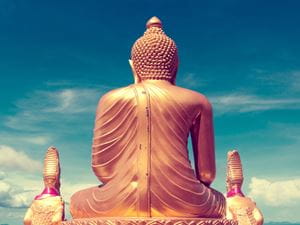
At first glance, Buddhism and Christianity seem as different as it is possible for two religions to be. Buddhism was born out of the same basic foundations as Hinduism and Jainism. It is based on the concepts of reincarnation and karma. Christianity, on the other hand, had its beginnings hundreds of miles north and west of Buddhism’s native India. Christianity grew from Judaism and the monotheistic teachings of Jewish thought. Buddhism is renowned for its meditative practices. Christianity is known for its charity, volunteer work and evangelism. The two great religions seem like complete opposites. That does not mean, however, that there are not points on which they agree. There are a number of the Buddha’s sayings that Christians would whole heartedly accept. In fact, a number of those quotes mirror the teachings of Jesus.
“Be where you are; otherwise you will miss your life.”
The Buddha’s advice speaks to the Buddhist idea of mindfulness. Mindfulness is when a person keeps their focus on what they are doing at the moment and nothing else. Staying present instead of being distracted by the unchangeable past or unpredictable future is a piece of advice with which Christians can agree.Though they deal with different specifics, Christ’s advice in Matthew 6 has a similar theme. “Therefore, do not worry about tomorrow, for tomorrow will worry about itself. Each day has enough trouble of its own.” Though Jesus was likely not dealing with mindfulness, He still told His disciples to focus on one day at a time, just as the Buddha did.
“Give, even if you only have a little.”
There is a story in the Bible of how several Israelites went to the Temple and gave large amounts of money. Right behind them was a poor widow who gave only two copper coins. The offering was tiny, but Jesus called His disciple’s attention to it. “This poor widow has put more into the treasury than all the others,” Jesus said. “They all gave out of their wealth; but she, out of her poverty, put in everything she had to live on.”The Buddha’s advice on giving is not formulated as a story the way Christ’s is, but the message is the same. Generosity should not be reserved for when a person has a surplus of money, energy or time. One should always be sharing with and giving to one’s neighbors, loved ones and even complete strangers.
“If you find no one to support you on the spiritual path, walk alone.”
Both the Buddha and Christ emphasized that their disciples should focus on their spiritual journey and to accept that the disciples might need to leave behind friends or family members in order to take that journey. The Buddha said his followers were to walk alone if necessary. Christ told His followers that they would need to be prepared to abandon even their family in order to take up the cross and follow Jesus. “If you come to Me but will not leave your family, you cannot be my follower. You must love Me more than your father, mother, wife, children, brothers and sisters–even more than your own life! Whoever will not carry the cross that is given to them when they follow me cannot be my follower.”“However many holy words you read, however many you speak, what good will they do if you do not act upon them?”
Both Christ and the Buddha had something to say about people who claim to be faithful adherents of their religion but do not practice what they preach. They had little to no patience for such hypocrisy. Both of them agreed that faith was something that was meant to be lived not simply remembered.“An insincere and evil friend is more to be feared than a wild beast; a wild beast may wound your body, but an evil friend will wound your mind.”
Both Christ and the Buddha warned against keeping things or people nearby who would end up causing trouble later. The Buddha spoke specifically about false friends and the damage that they can do to someone who is unsuspecting. Christ spoke more generally about avoiding things that would cause a person to sin. “If your right eye causes you to sin, tear it out and throw it away,” He said. “It is better for you to lose one of your members than for your whole body to be thrown into hell. And if your right hand causes you to sin, cut it off and throw it away; it is better for you to lose one of your members than your whole body to go into hell.”“Hatred does not cease by hatred, but only by love; this is the eternal rule.”
Both the Buddha and Christ made it very clear that hate will only breed more hate, and darkness will only bring more darkness. The Buddha speaks of hatred ceasing from love, and Christ calls on His followers to “love your enemies and pray for those who persecute you.” This is an extreme form of the sort of love Buddha was describing, but it is amazing what a difference it can make in people’s lives when they are treated with respect and forgiveness,At first glance, Buddhism and Christianity seem like they would be diametrically opposed. The very most basic ideas about how the world works, up to and including whether time is linear or circular, are different in both religions. That said, the founders of the two religions had, at times, very similar ideas. It truly goes to show that sometimes, even in things that look like complete opposites, there is more similarity than difference.

